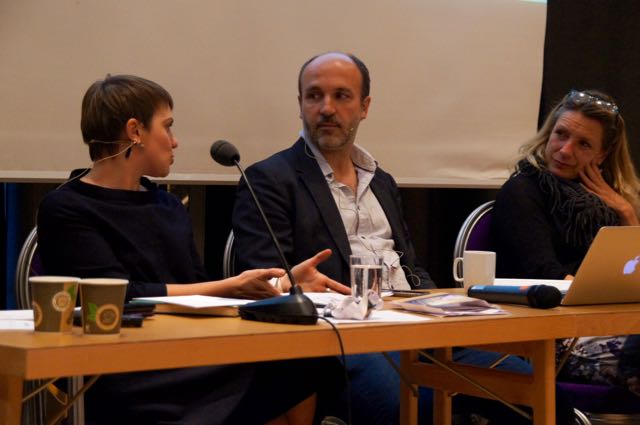 While reporting on war can be traumatic for a journalist, covering topics such as human trafficking, sexual violence and migration can be equally harmful.
While reporting on war can be traumatic for a journalist, covering topics such as human trafficking, sexual violence and migration can be equally harmful.
Gavin Reese, director of Dart Centre Europe moderated a discussion between Juliana Ruhfus of Al Jazeera, Nataliya Gumenyuk of Hromadske.TV and Cait McMahon of Dart Centre Asia Pacific, on ways to protect the health of both the reporter and the subject while covering traumatic events.
As a journalist, it is important to listen to the person you are interviewing, but equally important is listen to yourself and finding a balance, they said.
 “Sleep is my answer,” Gumenyuk reflected on her own experiences. She stressed the importance of taking a vacation, and said the pressure of always having to be online makes it difficult to relax. “People are overworked and understaffed.”
“Sleep is my answer,” Gumenyuk reflected on her own experiences. She stressed the importance of taking a vacation, and said the pressure of always having to be online makes it difficult to relax. “People are overworked and understaffed.”
Not only is it important for the journalist, to take care of his mental health for his own reasons, it can also prove beneficial in the reporting process. As Gumenyk pointed out, if the reporter is calm, the subject will be calm as well.
Some reporters, like Juliana Ruhfus, can sense when an interview subject is traumatized.
At the beginning of her interviews she sits down with the subject and says: “This is your story, how do you want to tell it? Where should we go? Where do you want to take me?”
Cait McMahon, managing director of the Dart Centre Asia Pacific, has given presentations on trauma as it relates to journalism for ten years.
Here is some of her advice:
-Risk assessment, ask yourself: Am I feeling more vulnerable than normal? What are my exit strategies?
-Learn to read your own reactions.
-Identify your meaning, purpose, sense of mission
-Grow your social support and network
-Physical fitness and build mental health
-Familiarity – inoculation files (imagine yourself going into a situation, store that in your brain, for as many scenarios as possible and when you go out into the field you will be more familiar with the situation).
-Pre load your phone with funny stories, shows, jokes, and other nice stuff
-Limit your dose to only what is necessary for the story, remember the mission and your purpose
-Manage energy
-Breath to refocus attention
-Have a safe place in your own mind that is beautiful to you
-Sense of humor
-Stay focused on task at hand – your role can be protective.
-Be mindful
-Rest, reflect, replenish
Bonus Track: Reactions from two Nepali journalists after the session:
The authors are journalism students at the University College of Volda who are on special assignment covering #gijc15.

